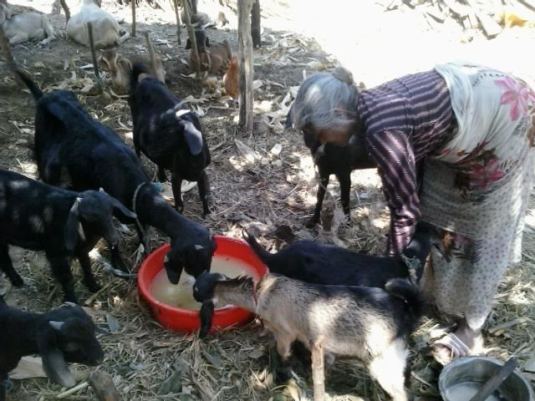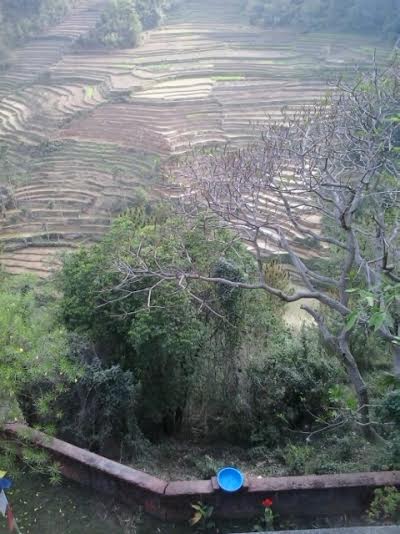It’s getting unbearably hot when I walk passed a grove with plum trees just outside Pharping. Suddenly two women run outside a nearby house. “Ayo, ayo!” they shout. Another small aftershock. I am surprised by their strong reaction. “I don’t feel like eating anymore”, says one of the women. She slumps down, resting her back against the outside wall of the house. This is the kind of reaction the gardener at the resort has warned me about.
I came to Pharping to be away for the weekend. I am blessed to have a new roommate, Chadani, who is ready to look after the ever growing flock of dogs in the house. Six and counting, including a puppy, Moti, that needs to be fed every three hours. If too late she barks with a fierce, indignant puppy bark from the top of the stairs, installing a deep sense of guilt in the latecomer.
I know of a place to stay in Pharping, a meditation retreat, but I am not sure if it is open. I decide to take my chances. I leave the scooter in the compound of a nearby monastery and walk over to the center, a lovely place with carefully trimmed garden and a white, beautifully adorned stupa in the middle.
The caretaker is around, and he shows me my room.
Suddenly it is there. As if materialized specially for me. A place that somehow I knew existed but was unable to reach it. The room has all I need. A view that acts as a perfect backdrop for a restless mind. Forested hills and rice fields with a few small figures on them: ploughing buffaloes and farmers planting rice seedlings. A road that winds up the hills, and disappears behind a pass on the highest point. And crows, lots of crazy crows, dancing a mad dance in the hot air above the fields.
It is quiet here. The few people who stay here are in silent retreat, and all I hear are the crows, the crickets, and in the distance, some vehicles ploughing up the road towards Kulekhani.
I read and read. Laurens van der Posts’ Venture to the Interior. The account of the fateful trip to the Mulanje Mountain in what is now Malawi. During the expedition the young forester Vance, who lives an idyllic life on the mountain with his devoted wife and baby daughter, dies in a freak incident. He drowns while crossing a gorge. Van der Post reflects on the tragic accident and wonders if he should feel guilty. He believes Vance already had the tragedy sleeping within him. “Accident and disaster without feed on accident and disaster within.” The split in Vance’s inner life is the outcome of an unhappy childhood. “[A] split in ourselves produces a split in the pattern of our lives, creates this terrible gash down the middle, this deep, dark Mlanje gorge, through which disaster runs and the devil drives.”
It is the age old question about to what extend we create our own lives, and to what extend we are responsible to whatever happens to us. An earthquake is an almost collective split. Quakes literally split open the earth, cracking up everything in its way: houses, roads, and mountains. What about all those who died in the recent earthquakes? Did they suffer the inner split? These are hard questions…
I contemplate on my own gorge. According to Van der Post all one can do is be aware of it, again and again. One can perhaps even cross it once in a while, or build a bridge across it. This is my meditation for today: meditation on the inner gorge, with a view of the terraced hills turning emerald green, that special colour of newly planted rice saplings.
I go over to the resort where I stayed some years ago. The gardener used to share some of his saplings with me. The Californian Poppy saplings he gave me once were my prized possession, even though I never managed to make them flower.
The gardeners’ sons are working abroad, in ‘Arab’, and the family managed to build a cement house with their income. The old house collapsed during the earthquake. It’s a story I hear over and over again. The garden of the resort looks as if it was hit by a storm. “It’s the lack of water,” the gardener explains, “all parts of the valley had some rain but not us.” The earthquake, dry winds and lack of rain have made the farmers depressed, he says. “Instead of being active, they sit and talk and talk, and become depressed. ‘Why bother to plant anything’, they say. ‘If we die we die’.”
The gardener instead keeps himself busy, even when it seems the garden will take months to recover. ‘When I am here I don’t think of earthquakes. I feel fresh.”
When I meet the women next to the plum grove I think of his words. They have planted maize intercropped with beans, but I notice that only the part close to the house has been watered. The further away plants are withering away.
The woman who no longer wants to eat gives me three plums. They are delicious and I tell her so. She now insists that I take more. A plastic bag is found, and her daughter is send into the grove to collect more. And do I not want a cup of tea? I leave with a bag of dark red plums. The generosity of Nepalese knows no bounds.
At night there is a deafening cricked sound. There seem thousands of them but I know from experience that even one can fill the universe with its chirping. Once in a while a car crosses the pass and its headlights throw a beam of light across the valley. It adds to the magical feeling of the place. I am deeply grateful to have found it.


